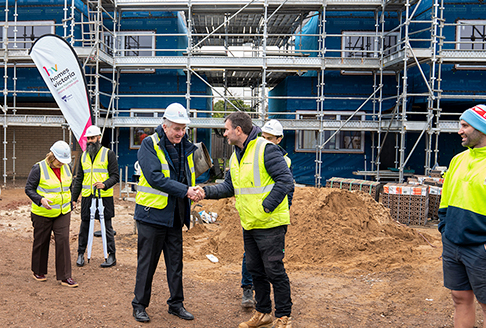Innovating to keep power bills down in new housing project
- 16 Jun 2022

As we enter one of the coldest winters in recent memory with the Consumer Price Index soaring, some families are finding it extremely difficult to heat their houses.
The Conversation reports that, ‘About a quarter of all Australians have trouble keeping their homes warm enough in winter. That figure is likely to soar this year, due to poor quality housing and the rapidly escalating energy crisis.’
The Australian Council of Social Services says that some people are having to make a choice between food and heating on a daily basis. One reason for this is the energy-inefficient design of most Australian houses, which have been likened to ‘glorified tents’.
Baptcare Affordable Housing (BAH) has looked at the enormous energy-cost stress on people who are in social or affordable housing. In response, all 20 social/affordable houses in our new development at Sunshine are energy efficient.
Eight are being constructed to the international Passivhaus standard – not just an Australian first, but possibly the first time this has happened anywhere in the world.
We were delighted to host a visit from Victorian Housing Minister Richard Wynne and local MP Natalie Suleyman MP to showcase what we are building and explain the thinking behind it – to shield residents from energy hardship.
“This is absolutely ground-breaking work that is going on here,” Minister Wynne said. “It is world-leading in terms of efficiency. For the families that are going to be living here…the utility bills will be maybe 20% of average bills. In some instances it may be a situation where residents are paying no utility bills at all.
“This is quite amazing (work by) our friends from Baptcare Affordable Housing…pushing the boundaries in terms of thermal efficiency.”
Ms Suleyman described the BAH development as “a game changer” and an important innovation in the social and affordable housing sector.
The development will provide housing support for larger families, sole parents, financially disadvantaged people, people experiencing family or domestic violence, and older Victorians who meet the criteria for social/affordable housing. All homes will be completed by November 2022.
The eight homes being built to full Passivhaus standards including airtightness, thermal insulation, ventilation, use of high-performance windows and doors and thermal bridge-free construction. The other 12 homes will be built to a 7-star energy rating and aim to achieve a minimum of gold standard of the Liveable Housing Australia for accessibility to and within the property.
This project has been funded through the Building Works Package, with the Victorian Government contributing $7 million to the $11.5 million development.
Community news
-

Back to School Tips for Foster and Kinship Carers
Heading back to school can be exciting, but it can also bring up big feelings—especially for kids in care. Here are a few simple ways to help make the transition smoother.
- 17 Apr 2025
-

Easter Reflection from Emily Booth of our Spiritual Care Team
A few years ago, at Easter, I was staying with my sister and her family for the weekend. One afternoon we were all sitting around chatting and the kids were playing when my sister came into the room and placed a tray of fresh, warm hot cross buns on the table
- 16 Apr 2025
-

Student Volunteer Spotlight - Erin
Did you know that Baptcare has student volunteers at some of our Residential Aged Care communities? Our volunteers are an integral part of our Baptcare community, not only in residential aged care but across many of our programs and services. Volunteers provide essential connection, positivity and assistance to residents, clients and consumers.
- 04 Apr 2025
